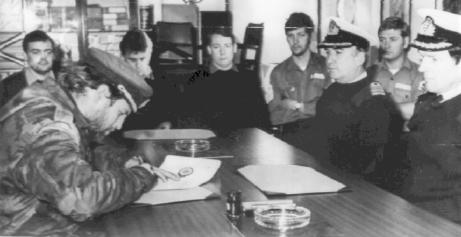The below is from a January 11, 1998 interview with Alfredo Astiz, a retired Argentina naval captain, in Tres Puntos, a weekly magazine published in Buenos Aires. Astiz was among those who participated in the military's "dirty war" against leftists and dissidents between 1976 and 1983. After learning of the interview below, Argentine President Carlos Menem asked the Navy to inflict "the maximum punishment" on Astiz for his comments; on January 12, Astiz was sentenced to sixty days' detention in a naval barracks. The interview was conducted by Gabriela Cerruti and translated from the Spanish by Marko Miletich.
GABRIELLA CERRUTI: How many did you kill during the "dirty war?"
ALFREDO ASTIZ: Never ask a military man that question.
GABRIELLA CERRUTI:Why?
ALFREDO ASTIZ: Because you'd rather not know.
GABRIELLA CERRUTI: How were people killed?
ALFREDO ASTIZ: I don't know. Some we would kill in shoot-outs. I don't know what happened to others; I usually delivered them alive.
GABRIELLA CERRUTI: Did you participate in some flights where they threw people into the sea? [In 1995, another naval officer, Adolfo Scilingo, revealed that drugged prisoners were regularly dumped into the ocean from low-flying military aircraft.]
ALFREDO ASTIZ: No, I was never on the flights.
GABRIELLA CERRUTI: But you know what they were like.
ALFREDO ASTIZ: I'll talk about the things I did. I would be told: go get so and so, and I would go and get him. I would deliver him, dead or alive, and I would go on to the next assignment.
GABRIELLA CERRUTI: Did you kidnap people and torture them?
ALFREDO ASTIZ: I never tortured. It wasn't my duty. Would I have tortured if I had been ordered to do so? Yes, of course. The Navy taught me to destroy. They didn't teach me to build, they taught me to destroy. I know how to place mines, bombs - I know how to infiltrate. I know how to kill. I know how to do all of that well.
GABRIELLA CERRUTI: Did you kidnap babies?
ALFREDO ASTIZ: No, never, I was always against that. That was one of my great arguments. I returned babies. Once a horrible thing happened to me. We had a fucked-up shoot-out, and when it was over we went in and there were two children on the bed. I found out who they were and took them to their grandparents. Three days later they gave me another assignment, to get a woman, just her. It was very hard, and in the middle of the operation there was an explosion. The woman had killed herself with a grenade. We went in, and there was a bathtub covered with some mattresses, and underneath the mattresses there were two boys. And they were the same boys from before. They had lost their father and mother in one week.
GABRIELLA CERRUTI: What happened to the kids?
ALFREDO ASTIZ: I took them to their grandparents again.
GABRIELLA CERRUTI: Do you remember all the assignments you carried out?
ALFREDO ASTIZ: No, there were a lot. It was my daily job. In the morning, they would give me an order; I would go. That's why all the hypocrisy about why we didn't argue or we didn't refuse our orders is terrible. I didn't argue. I have the soul of a military man, and the first thing they taught us is that we had to obey our superiors. But also I agreed with my superiors. They were the enemy.
GABRIELLA CERRUTI: Adolfo Scilingo said he was sorry. Do you regret anything?
ALFREDO ASTIZ: No, I don't regret anything. Scilingo is a traitor. But I don't want to talk. This is why I don't agree to interviews of pictures. You journalists have to be careful; you are going to end up badly. You shouldn't corner us, because we don't how we are going to respond. You are playing with fire. The armed forces have 500,000 men technically trained to kill. I am the man in this country best prepared to kill a politician or journalist. Every day colleagues come to seem me and say: You must lead an insurrection. I always give them the same message: Relax, we have to wait.
GABRIELLA CERRUTI: How do you live when you are repudiated every time you go out, when you can't leave the country, and when you are the symbol of everything bad?
ALFREDO ASTIZ: It's not like that. And if it is, that's the sacrifice I must make for the Navy. But I lead a normal life. I read books about physics, history, and politics. I have friends. Yesterday, I went to a birthday party. The Navy looks after me and protects me.
GABRIELLA CERRUTI: What work do you do?
ALFREDO ASTIZ: I don't know. I don't do anything. When something happens I tag along. The other day my friend's computer broke, and I went to fix it. And another time a friend of mine had a fire in his field, and I went to put it out.
On April 26, 1982, unable to withstand a British attack for more than 24 hours, Alfredo Astiz surrendered to a small commando force on Georgia Island during the Falkland Islands War. Astiz signed an unconditional surrender document on board the British HMS Plymouth without firing a single shot violating the military code's article 751: "A soldier will be condemned to prison for three to five years if, in combat with a foreign enemy, he surrenders without having exhausted his supply of ammunition or without having lost two thirds of the men under his command."




 Back to Militarismo Page
Back to Militarismo Page